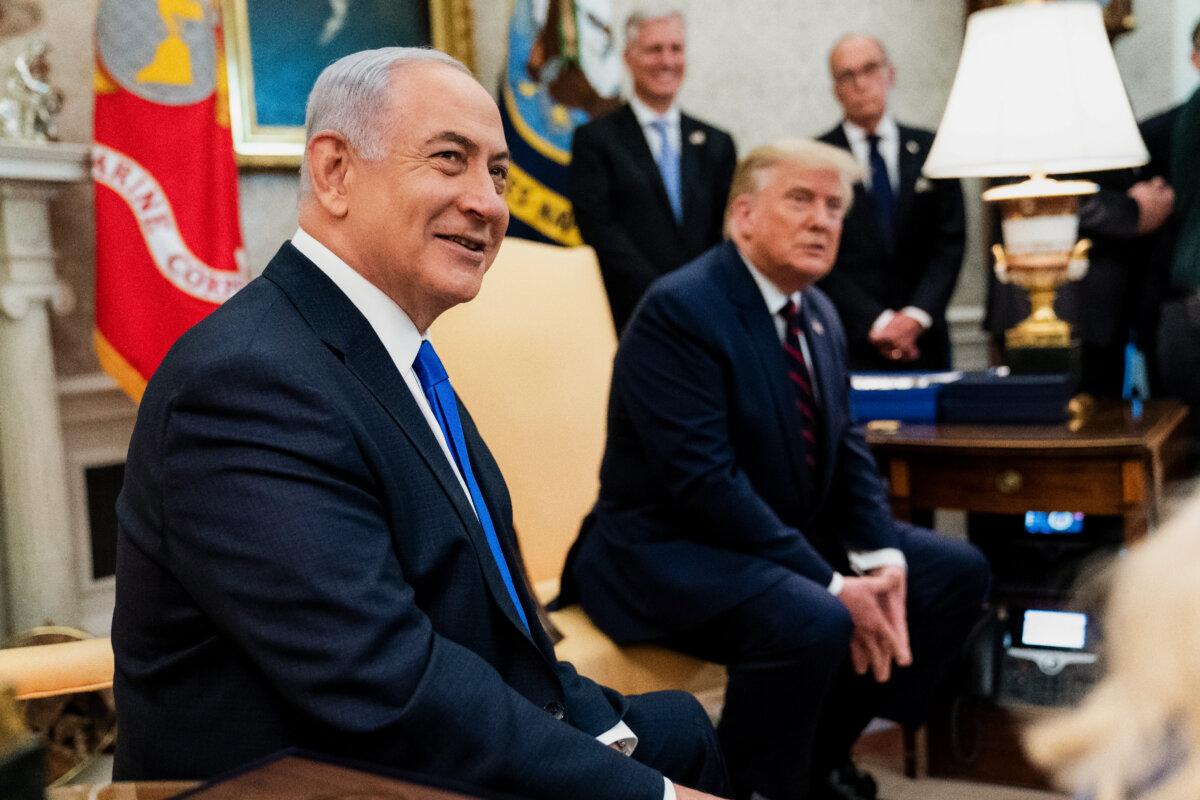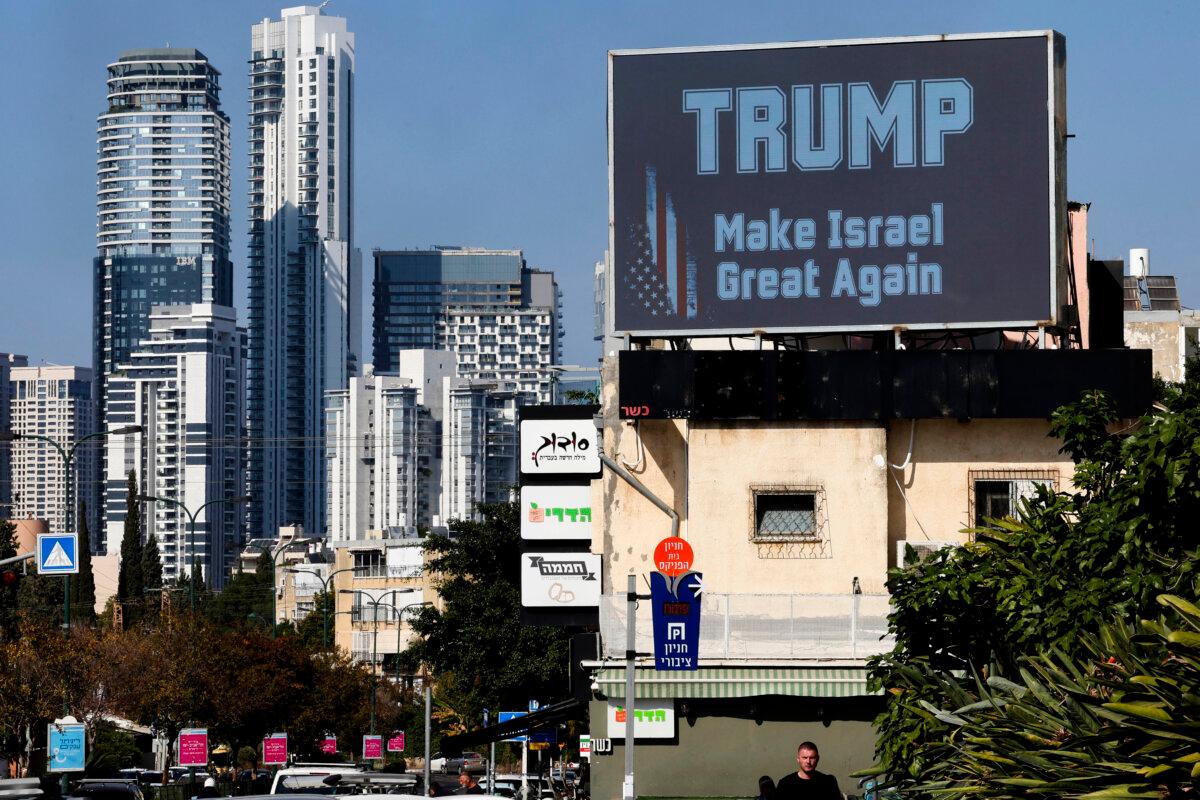Netanyahu’s circle views the returning U.S. president as more aligned with Israel’s needs, while some on the left caution that Trump may pursue his own agenda.
Israeli reactions to Donald Trump’s electoral victory ranged from jubilance on the right to distaste and fear on the left and among the Palestinian population in a society where political divisions often mirror those in the United States.
Gantz noted Trump’s signing of the Abraham Accords, making peace between Israel and four Arab nations, his recognition of Israel’s annexation of the Golan Heights, and his moving the U.S. Embassy to Jerusalem.
Mahmoud Abbas, head of the Palestinian Authority on the West Bank, struck a conciliatory tone. He congratulated Trump on his election and said he would cooperate with the new administration to reach regional peace.
“We will remain steadfast in our commitment to peace, and we are confident that the United States will support, under your leadership, the legitimate aspirations of the Palestinian people,” Abbas said in a statement.
Harel believed it was premature to speculate on Trump’s foreign policy. He viewed his first term as a mixed bag. “Trump will prioritize his own interests, which may not always align with the expectations of Netanyahu’s coalition.”
While Trump, in Harel’s view, “signaled a message of isolationism, expressed sharp reservations about American investment in defending allies, and showed reluctance to engage in unnecessary foreign wars,” he also “embraced Netanyahu’s arguments and withdrew from the Iran nuclear deal in a manner that pushed Tehran closer to developing a nuclear weapon than ever before.”
Trump ‘Going to Stop Wars’
Republican National Committee spokeswoman Elizabeth Pipko, a Jewish activist and the daughter of Russian immigrants, stated on Israeli television that Trump would aim for Israel to conclude its wars swiftly—with definitive victories.
When asked about Trump’s statement at the end of his victory speech that “I’m not going to start wars, I’m going to stop wars,” and whether this meant he wanted Israel to end its conflicts with Hezbollah in Lebanon and Hamas in Gaza, Pipko responded, “I would say he expects them to end it by winning it, 100 percent. That’s how he always talks about ending wars,” citing her 2018 wedding at Trump’s Mar-A-Lago Club.
“I also believe the response on Oct. 8, had it happened (on his watch,) would have been very, very different.”
She emphasized that Trump desires these wars to end with “decisive victory.”

U.S. President Donald Trump and Prime Minister of Israel Benjamin Netanyahu meet in the Oval Office of the White House in Washington on Sept. 15, 2020. Netanyahu was in Washington to participate in the signing ceremony of the Abraham Accords. Doug Mills/Pool/Getty Images
When Levi pointed out that achieving a ‘decisive victory’ has taken more than a year, Pipko blamed the Biden administration’s inconsistent policy, its failure to secure the release of Americans held by Hamas, and its apparent focus on the 2024 election in handling the conflict, for prolonging the war and causing “unnecessary bloodshed.”
Settlement Politics
Israel Ganz, head of the Yesha Council representing Jewish residents of the West Bank, referred to as Judea and Samaria by many Israelis, viewed the moment as a historic “opportunity for the settlement movement.”
Parties advocating for Jewish residents in the West Bank play a significant role in Netanyahu’s coalition, which has accelerated Israeli development in the area.
Perhaps signaling expectations from his coalition, Netanyahu replaced Israel’s U.S. ambassador.

A man walks in front of a billboard displaying a message in support of U.S. presidential candidate Donald Trump in Israel’s coastal city of Tel Aviv on Nov. 5, 2024. Jack Guez/AFP via Getty Images
The new appointee, Yechiel Leiter, resides in Gush Etzion, one of Israel’s West Bank settlement blocs.
He was born in the United States, and his son, IDF Maj. Moshe Yedidya Leiter was killed in battle in Gaza on Nov. 10, 2023, according to Israel’s Government Press Office.
Ganz called Leiter a “key partner in English-language advocacy for Judea and Samaria.”
Settlement politics figured into reactions from the Palestinian perspective as well. Columnist Jack Khoury, writing in Ha’aretz, said Palestinian prospects are worse now than in Trump’s first term: “No pressure for a withdrawal from Gaza, no negotiations for a diplomatic solution, and no talk of a plan that will halt the settlement project.”
Khoury alluded not only to Jewish settlers on the West Bank but to calls for some from that quarter to resume Jewish settlement in Gaza.
Then-Prime Minister Ariel Sharon unilaterally withdrew Israel from Gaza in 2005. Almost 9,000 Jewish settlers from the Gush Katif settlement bloc in south Gaza, between Rafah and Khan Yunis, had to leave their homes, some removed kicking and screaming by Israeli troops. The memory and resentment linger in some circles in Israel.
A group of settlers recently formed an encampment on Israeli soil near the Gaza frontier. One, a pregnant woman, told a Times reporter that it was a temporary stop. They intend to settle in Gaza, she said. “We have to settle inside Gaza. We have to take our enemy’s land. Well, it’s our land, actually.”
The Associated Press and Reuters contributed to this report.
Source link






